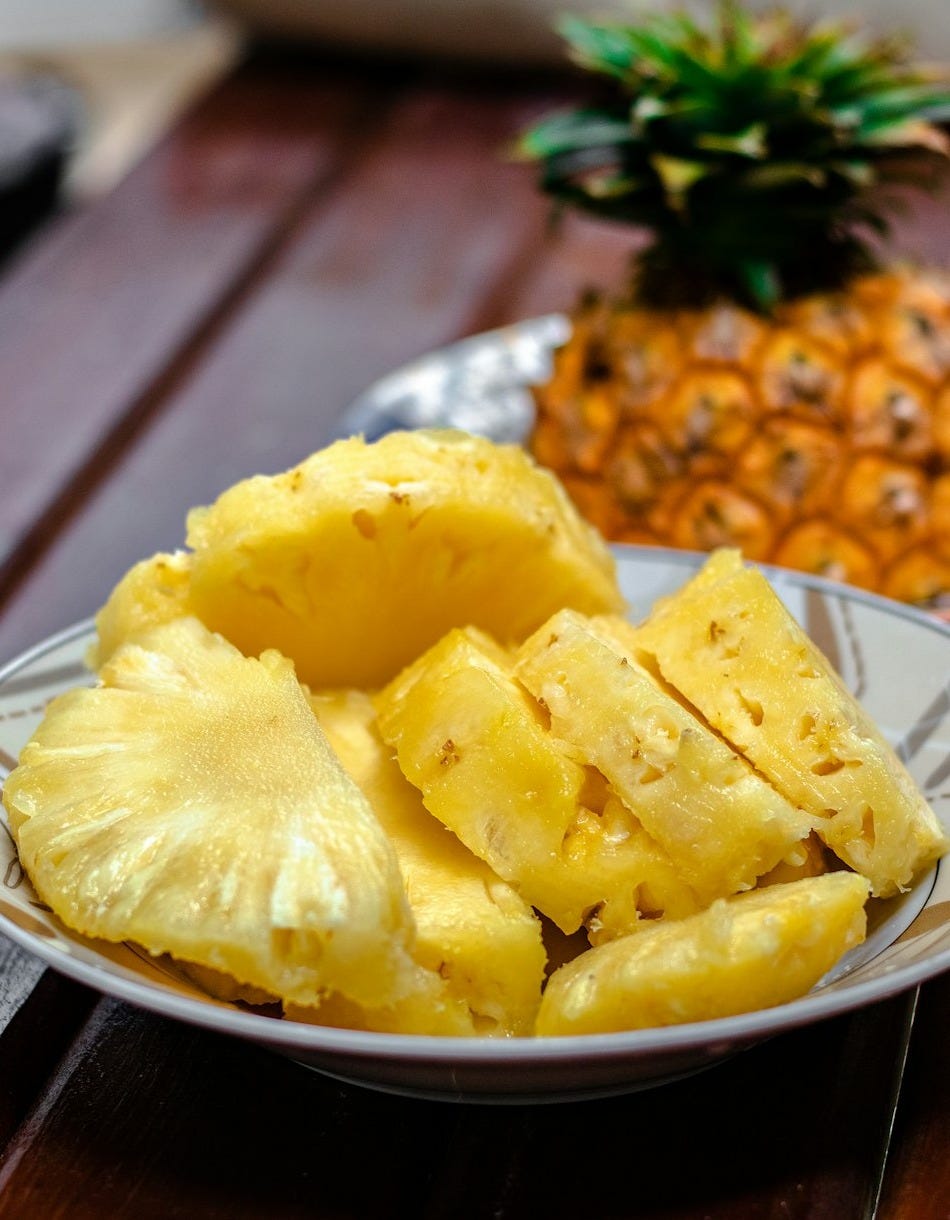I’m making this post free to all subscribers. Most of my clinical recommendations and responses will only be available behind the paywall. Subscribe for full access.
One of my jolly patients was in the dental chair for her routine dental cleaning. The hygienist gives a positive report of her oral health and homecare with the note that she does build up some calculus on her teeth (deposits of mineralized plaque).
I shared with her about a discussion I participated in at a recent oral biology conference where we talked about how eating pineapple can help with this.
Her eyes widened in amazement.
“Seriously?” She asked.
“Yes,” I continued, “And here you thought you were going to hear the usual dental spiel about flossing more.”
We all laughed. It was one of those comic relief moments that I strive for in the dental clinic.
Seriously, pineapple!

A systematic review published in January 2025 in the World Journal of Advanced Research and Reviews, concluded that
The bromelain enzyme in pineapple has antibacterial properties against Streptococcus mutans, thereby inhibiting the occurrence of tooth decay.
Let’s break down a few basics about oral health and how pineapple can be helpful.
Both tooth decay (cavities) and periodontal (gum) disease have a bacterial component and are directly affected by the pH (acidity or alkalinity) of the mouth. For this discussion, we’ll focus on plaque and cavities.
Sugars, bacteria, and plaque cause a drop in pH which pulls minerals out of your teeth leading to the formation of a cavity.
Pineapple is a fruit that is high in fiber (good for your gut) and also high in water content. It contains calcium, potassium, iodine, sulfur, chlorine, phenol, and bromelain.
Pineapple can block bacteria from producing the sticky polysaccharides that help them adhere to your teeth. It also increases saliva production and salivary pH which washes your teeth and promotes a healthy environment. Furthermore, the chlorine reacts with the water to form hypochlorite, the main anti-microbial ingredient in my favorite treatment mouth rinse from CariFree.
Bromelain is a mixture of enzymes. While we don’t know all its specific mechanisms of action, studies indicate it has anti-inflammatory, anti-microbial, and anti-cancer effects.
Those three properties pack a powerful punch!
Bromelain stays active at a wide pH ranging from pH 3 to 7 which is remarkable and exquisitely useful as a medicament.
Another study showed that the pH of dental plaque only dropped from 6.35 to 6.04 after eating pineapple fruit while the control group’s dental plaque dropped to 5.7. The study specified that participants were chewing pineapple fruit or pineapple stem. You’ll see that this is important later.
We know the pH of our mouth drops after eating or drinking anything with sugars or carbohydrates and that the critical pH at which enamel breaks down is 5.5 or below. It takes a healthy saliva 30-45 minutes to bring the pH back to the neutral zone. A food that maintains a higher level of pH in the mouth is a good deal.
I’ll do an essay sometime on everything you don’t remember about pH from your high school chemistry class and how it pertains to your dental health, but for now, let’s move on.
How I suggest you incorporate pineapple into your diet and oral health care.
If you are like me, you tend to have a sweet tooth after meals. So given that I know the pH of my mouth has dropped with eating, I want to accelerate bringing it back up to a healthy zone along with stimulating my salivary flow.
Most large grocery stores in my area sell ripe, cut pineapples in small containers found in the refrigerated produce section. This makes it easy. Pick up a container once or twice a week, and you have a ready healthy dessert to finish off your meal.
I find that 2-4 sweet juicy pieces of pineapple satisfy my sweet craving and I’m promoting my oral health along with getting some great fiber.

Caution: Here’s how not to eat your pineapple.
Avoid snacking on pineapple throughout the day. It has fruit sugars and is naturally a bit acidic. The frequency of eating contributes to cavities. Hard stop. No snacking. Eat your pineapple with your meals.
Don’t drink pineapple juice. While it still contains many of the minerals and enzymes discussed above, it lacks the fiber, concentrates the sugars, and bathes the teeth. No bueno. Chew, don’t drink.
Research continues, stay tuned
My inner dentist geek is excited about all the fascinating research happening around pineapple and bromelain, including cancer treatments.
And I’m super excited that I can recommend this delicious tip to my patients. Yes, the basics of good oral hygiene still apply to maintaining your teeth but what a great way to eat healthier and naturally regulate your plaque and pH.
Enjoy!




This is so cool! I'm going to remember this one.